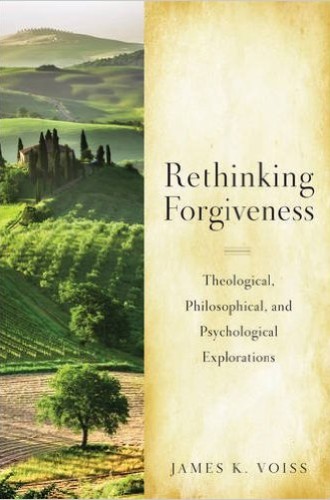How do we forgive?
No one can pass through life without being challenged either to offer or to accept forgiveness. Forgiveness is undoubtedly at the forefront of the teaching and example of Jesus, as well as a crucial component of the Christian life and the identity and mission of the church; indeed, to tell the story of Jesus is to commit to being agents of forgiveness and reconciliation.
But what exactly is forgiveness, and is it always possible? Are there times when it is unwise to forgive or when forgiveness ought to be withheld? And is forgiveness even feasible when the one needing forgiveness refuses to repent? Moreover, is there anything distinctive about Christian forgiveness?
Read our latest issue or browse back issues.
These are some of the questions James K. Voiss takes up in his extensive, superbly researched, balanced, and consistently astute analysis of a practice we may not understand as well as we think. Voiss wants “to look at forgiveness with fresh eyes” and relocate the discussion “in a new landscape.” He summons us to envision God’s forgiveness not primarily as escaping God’s wrath but as the most poignant and extravagant expression of God’s love, a love that relentlessly seeks communion with us no matter how great our manifold failures and persistent refusals might be. As Voiss writes near the end of the book, “Whether in the initial act of creation or in the restoration of right relationship through grace-mediated reconciliation, God is consistently appealing to humankind to embrace the relationship God offers.”
Voiss does not arrive at that reassuring conclusion quickly or easily. He contends that in order for Christians to think rightly about forgiveness, they must first become acquainted with what philosophers and psychologists are saying about forgiveness, and they must especially scrutinize what is going on whenever we attempt to forgive. He begins his excavation of the landscape of forgiveness by turning to the work of French and Anglo-American philosophers, starting with Jacques Derrida.
While sympathetic to Derrida’s analysis of forgiveness through the lens of hospitality and gift, Voiss rightly observes that Derrida’s persistent emphasis on forgiveness as unconditional and untainted by any expectation of return makes forgiveness virtually impossible. For Derrida, forgiveness is an “event” that can occur only in the face of something that is utterly unforgivable, something so horrendous that it falls outside the realm of morality, and only when the one forgiving is unable to remember having forgiven. Derrida’s commitment to maintaining the purity of forgiveness renders it practically incoherent.
Paul Ricoeur offers a more promising account because he focuses not on the seeming impossibility of forgiveness, but on the generosity and love that enables the one who forgives to see an offender as more than the wrong he has done. For Ricoeur, the unique power of forgiveness is that it unbinds a wrongdoer from her mistakes and, if completed in reconciliation, restores a relationship that had been damaged or even destroyed.
Unlike Derrida and Ricoeur, who despite their differences both insist that forgiveness must be unconditional, the primary concern for the Anglo-American philosophers whom Voiss considers is the conditions under which forgiveness is morally permissible. Although there are important differences between these philosophers (Jeffrie G. Murphy, Joram Graf Haber, Pamela Hieronymi, and Charles Griswold), they concur in recognizing the pivotal place of resentment within the process of forgiveness. Resentment is evoked whenever our dignity and well-being have been undermined by another’s behavior.
These philosophers agree that the person who has been harmed must recognize the harm—and may experience a desire for vengeance—but in forgiving chooses both to overcome the justified resentment and to renounce any strategies for revenge. Most important, they stress that to forgive is not to condone a wrongdoing or to passively accept it; rather, it is to free a wrongdoer from his offense and to help the person who was harmed find healing. Nonetheless, a shortcoming of each of the philosophers Voiss examines is that by focusing almost entirely on the conditions warranting forgiveness, they fail to address why so many people find it difficult to forgive.
One of Voiss’s most important contributions is to underscore how Christian accounts of forgiveness can be enriched by engaging psychological approaches. The psychological literature on forgiveness does not hesitate to note the crucial role our affections play in the process of forgiveness. And psychologists’ emphasis on reinterpreting the event that necessitated forgiveness can help the person harmed see herself as something more than a victim and the offender as “something more than the agent who produced the harm.”
In short, because human beings are moral agents, forgiveness is something we can freely choose. Forgiveness is a freely made decision to alter our feelings toward the one who has hurt us, to behave toward the wrongdoer in ways that exemplify our forgiveness and our desire to rehabilitate the relationship, and to support the wrongdoer in growing in behavior that is both right and good.
What Voiss appreciates most about psychological studies of forgiveness is that they acknowledge the role of the unconscious in either aiding or hindering forgiveness, and they (unlike the philosophers) recognize factors that can affect one’s ability to forgive (such as relationships, cultural milieu, family background, past history, psychological development). Yes, we are free to forgive, but that freedom is conditioned and limited by a number of things, many of which we may not be aware of.
The second part of the book can best be described as a phenomenology of forgiveness. For Voiss, we will not fully appreciate what is distinctive about Christian forgiveness unless we first probe what we are doing when we attempt to forgive. He begins his scrutiny by diagnosing the experience of harm. Such an event “destabilizes us,” Voiss contends, because it disrupts “how we make sense of ourselves and of our world to ourselves.” Even worse, it “posits a world in which it is legitimate to denigrate the worth of the victim.” When this occurs, the person who was wronged must respond in a way that restores both his sense of self and the coherence of his world.
But, Voiss posits, this move is impossible in the face of responses that either repudiate or falls short of forgiveness, because in such instances the harm the person suffered is not overcome and left behind but embedded more deeply within her. Put differently, because as persons we are continually in the process of becoming, how we respond to the harm we have suffered—whether we forgive or choose to become bitter and resentful—will determine how our future becoming will unfold.
Voiss recognizes that forgiveness is often a process that begins with the act of forgiving but that requires a commitment to continually forgive as memories of the hurt one has suffered resurface or feelings of anger and resentment reappear. This is why he says forgiveness is ordinarily best understood as a trajectory, in which the original decision to forgive must periodically be reaffirmed.
Because we can never be absolutely certain that the forgiveness we offered is irreversible—and because we may later feel ambivalent about having forgiven—there is an “eschatological quality” to forgiveness; forgiveness is inherently an act of hope. As an act of hope, forgiveness is oriented to reconciliation, but reconciliation is possible only when the person needing to be forgiven claims responsibility for her actions and genuinely repents.
It isn’t until part three that Voiss considers Christian theologies of forgiveness. Although this effort may seem to come relatively late in the book, Voiss suggests that the prior study has opened up some promising ways to think about Christian forgiveness.
In exploring the landscape of Christian forgiveness, his primary conversation partners are Lewis Smedes, Miroslav Volf, and L. Gregory Jones (particularly Volf and Jones). Voiss is sympathetic to, and appreciative of, the work of each of these theologians, particularly how Volf’s and Jones’s accounts of forgiveness are thoroughly informed by the Christian narrative. He notes that what distinguishes Christian forgiveness for them is the motive for forgiving. A Christian forgives out of gratitude for having been undeservedly forgiven by God. Knowing one to be a forgiven sinner enables one to be generous in forgiving others; in short, a disciple lives a forgiven and forgiving life.
Yet, Voiss argues, the traditional account of Christian forgiveness no longer works for many people, because they do not see themselves as sinners deserving God’s wrath who have been mercifully spared. In a “postmodern ethos” the “landscape of Christian forgiveness has shifted” because for a growing number of Christians the language of sin, judgment, and damnation has become increasingly marginal, even irrelevant; thus, we need to tell the Christian story in a new way.
“How can we tell the Christian story in such a way that contemporary Christians and others can see themselves in it and can find in it the deeper truth of their own experience?” It may be that many Christians think of themselves not primarily as forgiven sinners, but as persons who are unceasingly loved by a God who seeks communion with them. Such persons, Voiss suggests, are likely to be motivated to forgive not so much because God has forgiven them, but because God loves them and they want to extend that love to others.
Voiss proposes that instead of considering forgiveness through the lens of sin, the alienation it effects, and God’s judgment and mercy, we should (and here he follows Karl Rahner) view it in terms of “God’s desire to give God’s self to us in love,” a desire that is most fully expressed in the incarnation. The primary activity of God is to reach out to us in love and to seek communion with us, and God does this through the grace that is always available to us, through Christ and the Spirit, through the sacraments, particularly the Eucharist, and through forgiveness. If our thinking about forgiveness begins with this conviction, then God’s forgiveness is best understood not as a welcome alternative to God’s wrath, but as an invitation to overcome any estrangement between God and ourselves in order to enter more deeply into relationship with God.
What does this mean for the church? The Gospels reveal that Jesus’ ministry can rightly be described as one of “proactive” forgiveness inasmuch as Jesus often offers forgiveness when it is not requested, or even recognized as a need, in order to call people to fullness of life in communion with God and others. Christians should do the same. They should be sacraments of God’s forgiving love, a love that works to overcome all divisions, a love that seeks to heal and make whole, so that all may grow in communion with God and one another. In such a way, Christians, who with God’s grace continually strive to realign the trajectory of their lives away from sin to God, offer to others the hope that comes from that always unfinished transformation. In doing so, they participate in the creative and redemptive activity of God and help bring the reign of God more fully to life in the world.
Much more can be said about a book that aims to reorient, expand, and perhaps unsettle how we think about Christian forgiveness. The highly scholarly nature of the book, the complexity of its arguments, and the extensive analysis of a variety of thinkers suggest that its primary audience will be theologians and graduate students. But any patient reader will encounter here the heart of the gospel.







